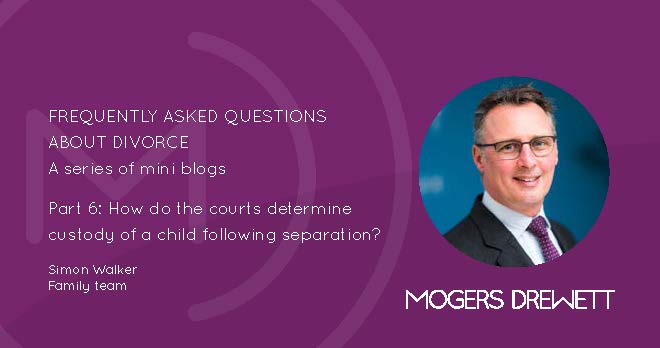FAQs About Divorce – How do the courts determine custody of a child following separation?
In this week’s mini blog, Simon Walker, Solicitor in the Family Team in our Sherborne office, looks at ways separating couples can agree arrangements for the children. Parents who are separating are expected to reach a resolution in relation to the care of their children between themselves. The reaching of a consensus ought to be on the basis of what arrangements would be in the children’s best interests rather than the parties.
Both parties will have parental responsibility for their children, which effectively means that they have each all rights, powers and duties in relation to their children, along with responsibility towards their children.
If parents are unable to reach a consensus as to what’s in their children’s best interests, in terms of their future arrangements, then the parties will be expected, in the first instance, to attend mediation.
Mediation is a voluntary process, where parties will be assisted by a mediator to explore the various options open to them and select which option will best suit their children and their needs. If parties are unable to agree through mediation, then it will be open to either party to issue an application at court, and for the court to determine what arrangements would be in their children’s best interests. Issuing at court should be considered a last resort from either parent but, sometimes, last resorts cannot be avoided.
When the court is asked to determine future arrangements, they will look at what the arrangements for the care of the children was during the course of the marriage and seek to replicate those arrangements. If you both worked and shared the care then it is likely to follow that this arrangement will continue. If there is a dispute the court will go on and ascertain the wishes and the feelings of the child concerned if the child is old enough.
The court will also look at the child’s physical, emotional and educational needs and the likely effect on him/her of any change in his/her circumstances, taking into account age, sex, background and characteristics, any harm that the child has or is likely at risk of suffering. It will also look to you both and how capable either of you are as parents are at meeting the child’s needs.
On this basis, the court will utilise its range of powers to determine the question asked of it. Utilising the court to determine the future of the arrangements of the child will result in an order being made, which might result in neither party being satisfied with the outcome and this is why consensus between the parties is always preferred by the court.
If you would like more information, please contact us on 01935 813691 to arrange a fixed-fee initial consultation.

